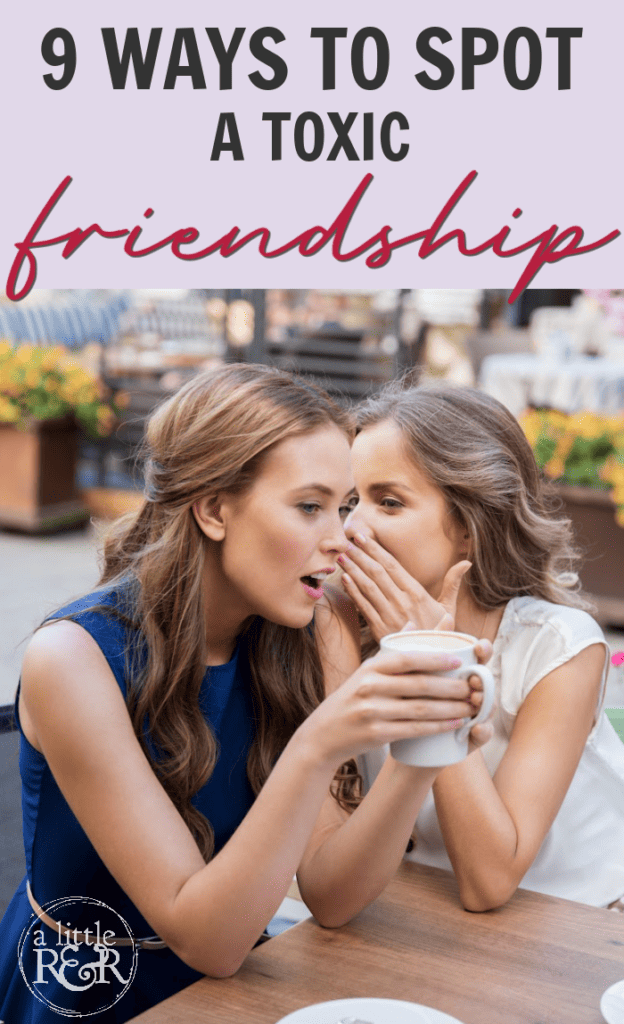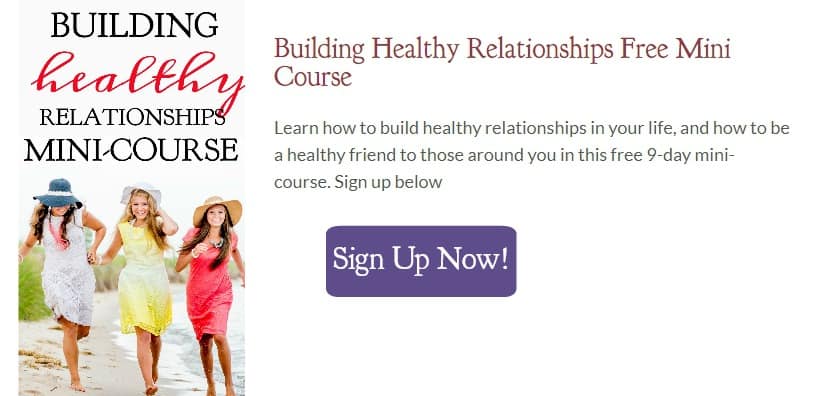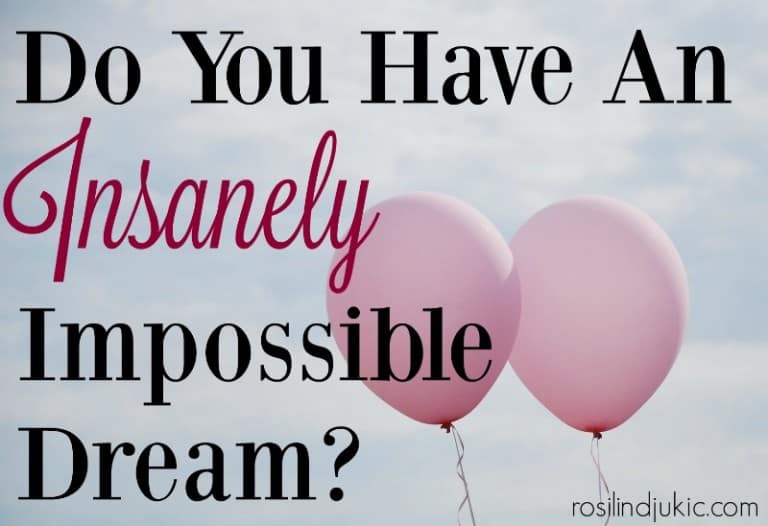9 Ways to Spot a Toxic Friendship
I hope you love the products and resources I recommend here at A Little R & R. Just so you know, it is possible that I get a commission and collect income from the links on this page. Click here for more info.

We all have – or have had – a toxic friend in our life.
The friend who lives in constant drama or who is clingy and manipulative. After hanging out with them, we feel wrung out, discouraged, and drained of all emotional energy.
But sometimes we have toxic friendships and we’re not even aware they are toxic.
But slowly over time it takes its toll.
We grow insecure and critical…we sometimes even turn into a mean girl.
It was inevitable.
I would walk away from a conversation happy and bubbly, but then the moment would hit.
Panic. Disappointment. Self-loathing.
“Why did you say that? What must they think of you! You always say such stupid things.
They will probably tell everyone they know what an idiot you are!”
These horrible thoughts would flood my heart as the joy I had felt moments before slowly vanished in the thick cloud of depression that would settle over me.
To be sure, no one but me was to blame for my horrible insecurity.
I would feed on these thoughts, send frantic text messages apologizing for whatever it was that I had said. I was a toxic friend.
However, there was another element in my life that contributed to this battle I waged in my mind.
Other toxic people I had allowed in my inner circle.
Toxic people often attract toxic people!
My inner circle was filled with people who fed this negativity with their own judgmental attitudes, pessimism, and gossip. And I entertained it all.
I listened to their judgmental declarations, pessimistic viewpoints and gossip, and then lived in fear that one day I would be the topic of conversation.
Those who gossip to you will eventually gossip about you.
The fear was so real that I could almost feel the condemnation in their eyes.
This is what happens when we surround ourselves with toxic people!
And it is true that those who gossip to us will one day gossip about us.
So how can we know if we are a toxic friend, or have toxic people in our lives and how do deal with those toxic people? Today I share with you 9 traits of a toxic friendship and in the next article we will look at how to deal with toxic people in our lives.
Here are 9 traits of a toxic friendship
1. Your friend demands your trust.
Simply put, trust cannot be demanded: despite position or title. Trust must be earned.
One can have respect for a position without respect for the person who fills that position, but this respect is still not considered trust.
Trust is earned based on one’s ability to be trustworthy, and a friend who demands your trust is not trustworthy. A healthy friend will never demand your trust.
2. You don’t leave feeling encouraged and inspired.
Does time with this friend make you feel depressed, pessimistic, defensive, belittled, used, or inadequate?
Do you often feel like you are treated like a child when you’re around them?
Healthy friendships should encourage and build us up. The type of behavior that leaves you with negative feelings should be an indicator that some boundaries are needed and this person is not someone that should be allowed in your inner circle.
3. Your friend often mocks others.
Mocking is a clear sign of toxicity. A person who mocks is simply not a healthy person to be around.
Sometimes mocking isn’t always very clear, so pay attention to the way your friend talks about others.
Is it with honor and respect, or do they put others down with little comments, slights, or a laugh? If so, this person is not a person to be trusted.
4. Your friend is a gossip.
Remember what I said earlier? Those who gossip to you will eventually gossip about you.
Beware of a friendship that feeds on gossip because it will eventually self-destruct. Besides, the Bible calls gossip an abomination.
If your friend betrays confidential conversations or shares with you information that you know was not meant to be public, you can be 100% certain that your friend is a toxic friend.
A healthy person is a fierce protector of their other friendships…and of yours!
5. Your friend is jealous and controlling.
There are some people who want to keep a friendship all to themselves because they fear that if you have other friends, you will eventually abandon them.
Usually this fear will drive them be jealous and controlling of the time you spend with others.
While to some their jealousy may seem flattering at first, it will blossom until they smother you with exclusivity.
Beware of a person who wants you to be their exclusive friend. A healthy person will encourage you to build friendships with those around you.
6. Your friend is defensive.
The Bible says that a true friendship is like iron sharpening iron. Now, this doesn’t mean that friendship should be based on confrontation.
That’s unhealthy. But in every friendship confrontation will eventually take place because no one is perfect.
The blessing of a friendship-confrontation is that a healthy friend confronts in love and always has our best interest at heart.
If “truth in love” is met with a defensive attitude – and consistently so – then this is not a healthy friendship.
A healthy person is someone who is able to take confrontation and process it because they are humble enough to recognize their own imperfections.
A toxic person is not willing to own up to their faults when confronted.
The dichotomy here is that often a toxic person is self-loathing and will make a joke of their own faults because they are able to make themselves the butt of their own jokes, but the toxicity is evident when someone else brings up a fault and is met with a defensive attitude.
7. Your friend must always be right.
If your friend leaves no room to for error, they are not a person you want to spend a significant amount of time around.
We all know that no one can be right 100% of the time, but a toxic person leaves no room for error in their life, because being wrong will demand they admit that someone else is possibly better than they.
This is not acceptable because a toxic person must always be best.
8. Your friend lies.
Obviously you cannot trust someone who lies.
And if your friend lies they are not trustworthy. A toxic person will often lie so as not to appear to be imperfect; because as I said earlier, a toxic person must always be the best.
So they will often cover up their failures with lies. This person has no place in your inner circle.
9. Your friend only talks about their own problems.
If your friend has no interest in talking about you, or getting to know you, then he or she is not a person you want to make an investment in.
A toxic person is always ready for someone to invest in them, their dreams, their visions, their ambitions, but when it comes time for them to invest in someone else, they are suddenly AWOL.
If your friend either neglects reaching out to you, or is suspiciously absent when it comes to investing in you, your dreams, your visions and your ambitions, it’s time to rethink your friendship.
Learn more about toxic friendships and how to choose safe people for your inner circle in this excellent book:
In my free Building Healthy Friendships Mini Course, I take you on a journey through examining your friendships, learning how to put them in proper order, and even confronting the toxic friends in your life.
You can sign up for the free mini-course here:









So glad I don’t have toxic friends! I can honestly say none of my friends fit this list! Thanks for hosting the link up!
That is truly a blessiing!
Thanks for this great article, it gives me heaps to think about , thank you for hosting each week. Blessings
Rosilind , Girlfriend this post was awesome. I really needed this in my teens, my 20s and some of my 30s too. Your 9 traits were absolutely dead on and I thank God for you and this post. This was truly beneficial to me to read and I pray I won’t be toxic or allow toxic people in my inner circle. Be blessed – Kia
Thank you so much!! Oh – and I needed this, too, back then. It would have saved me so much heartache! I am so blessed that this post spoke to you.
Thanks so much for hosting! Love the post! Thanks for the reminders!
Great post. I try to teach my kids how to have healthy friendships and how to let go of the ones that are not good for them. Thanks for hosting this great party every week!
Great job! Children need to learn from an early age!
Healthy relationships are so important. I know owe so well about toxic relationships. Kudos. I have had to learn to remove my self from them.
Good job at recognizing them and removing yourself from them. It is tough to do sometimes.
Thanks so much for the party Rosilind. Great article. It is so important that we align ourselves with the right people.
There are so many great posts! Thank you for the link-up. Your list of toxic characteristics is thought-provoking!
Honestly, this article has me analyzing not only my circle of friends but MYSELF! ouch! I want to read that book. I’ve never heard of it before now. Thank you for this. I am looking forward to the next installment.
Yes – examining ourselves is so important. We need to be healthy in order to contribute to healthy relationships
Wow, these would be major red flags. Thankfully, I have learned to stay away from people like this but more importantly, I need to check my own actions!
Yes – and me as well. I try to regularly examine my heart to see if any of these exist. I don’t want to poison the wonderful friendships I have!
This is so true and your wrote this out beautifully. I think we all know when we have a toxic friendship and it is these experiences where we can learn not to have these kinds of people in our lives. Thanks for sharing, and for hosting the linky party!
Yes – it is so true. These experiences teach us to keep our eyes and ears open for those who aren’t healthy.
What a great post!! Good reminders. My closest friends have always been ones where there was give-and-take. Such a blessing.
That is so valuable, Judith. So very, very valuable!
Great topic! Gonna Tweet, Share, and Pin!
Thank you, Bonnie!
Excellent points! We tend to be slow to recognize a toxic friendship and slower still to pull away from intimacy. Thanks for sharing this, dear!! And thanks for hosting!
You are right – it isn’t so easy to recognize those toxic friendships, and even harder to pull away from them.
This is such a great post! Thank you for sharing these wise words, Rosilind. When it comes to friendships, I have learned that it’s def quality over quantity.
I like that! Less is more!
These are such great points! I especially appreciate your statement that those who gossip with you will eventually gossip about you. I’ve found that to be so true, and by God’s grace, I’m thankful for building much healthier relationships these days. Thank you so much for linking up with us at Grace & Truth!
Yes – I have watched that play out in living color in my own life. And if I’m perfectly honest, I’ve sadly been the one who has gossiped to one…and then about that one.
I need to examine myself. I might have seen myself in 1 or 2 of those traits. 🙁
Thank you for these truths.
Oh – don’t despair. I think we all have at one time or another. I have to remind myself on a regular basis about one or two of them, too.
I can relate to your story in being self-judgmental. I pay attention to my thoughts and reactions and work on releasing judgment of myself and others. It is a process and I am getting better and better. Your list of traits of toxic people is stop on. I am blessed my family members and friends that do not exhibit any of those toxic traits. Thank you for your post
Yes, it is important to see these traits in ourselves as well as in others.
I like self-deprecating people, even if it’s viewed as one of the above listed signs of toxicity. It shows humility, a biblical biggie, and can deflect gossip via not buying into holier than thou-ness. It shows realness, human imperfection, and can hault a tirade of someone airing the dirty laundry of another over brunch. My two cents, but I think they are valuable.
I think it can be positive if it is genuine, but many times it is used to hide behind as well.
Some of these also apply to people who have autism spectrum disorder. It is not that they are toxic, just different. I would hate for someone like my daughter to be judged as being toxic because she cannot find the words to ask about you, may seem to mock a situation, but in reality did not understand it so to her it was funny, jealous of my time because no one else will give her their’s, always right -because of her attention to detail she is often right -or it is a different perspective on the situation or did not understand, defensive because she has been bullied for so many years that she goes into defensive mode when danger is barely sensed by her terrified being and she desperately wants to live….Yes, I often feel discouraged, or emptied because of all the energy that she sucks out of me. I have learned to go to God and ask to be refilled, or to kindly insist that I be allowed to go to bed so I can be there for her tomorrow. She doesn’t gossip. And I am thankful that she is still alive. There were too many years when that was not a sure thing….I would say, watch for these signs in yourself, and fix yourself, then you be the yeast in all of your relationships to work change for the better, but please don’t label her as toxic!
First, I want to applaud you for helping to raise awareness about autism. And while those with autism have needs unique to them, I would hope we could all agree that they also have needs that we all have – the need for relationship, the need for grace, and the need for understanding. I also would hope that as people seek healthy relationships, that they would understand the need to apply grace and understanding to those among us who have limitations that prevent them from relating to those around them in ways that others are able. This article is in the context of those relationships that are truly toxic…in the sense that there are those relationships in which one party seeks to cause drama and intentionally cause pain and broken trust. This, most certainly, wouldn’t apply to someone with autism and who perhaps has some of the behaviors in this article, but unintentionally so.